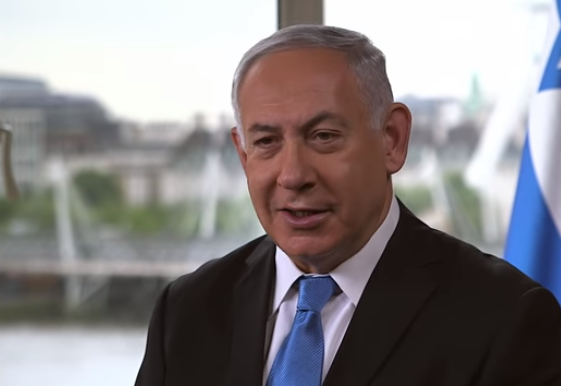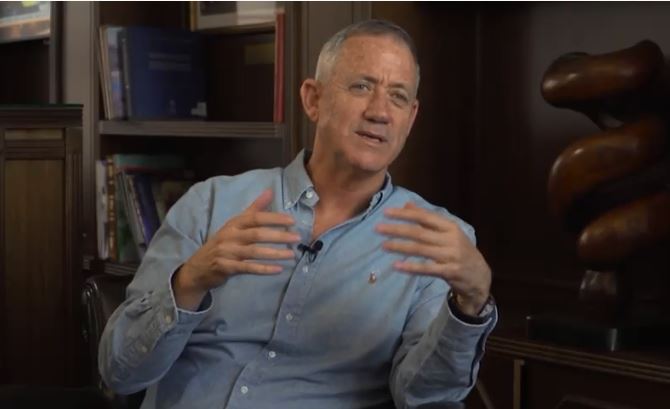
The Times of Israel: Israel’s 35th government was sworn in at the Knesset on Sunday, bringing an end to a 508-day political deadlock during which lawmakers were unable to cobble together a coalition.
The Knesset voted 73-46 in favor of the new government.
Likud leader Benjamin Netanyahu was sworn in as prime minister and will head the government for the fifth term of his political career.
Blue and White chairman Benny Gantz was sworn in as “alternate prime minister and future prime minister” as well as minister of defense. Netanyahu promised from the podium to hand over the premiership to Gantz on November 17, 2021.
Benny Gantz
“We established the precise terms under which our agreement will be fulfilled and will not be fulfilled,” Netanyahu said later in a Channel 12 interview, amid widespread skepticism that he will honor the deal. “I will fulfill exactly, but exactly, what is written in the agreement. It is my intention and my goal to do so. And there is no reason for me to say anything to you but, yes, that’s what we will do.”
In addition to Netanyahu and Gantz, 32 ministers were sworn in, including the first female ultra-Orthodox minister, Omer Yankelevich (Diaspora affairs), and the first Ethiopia-born minister, Pnina Tamano-Shata (immigration and absorption), in Israel’s history. A 35th slot, for a minister for minority affairs, has yet to be filled by Blue and White.
Totaling 73 lawmakers, the coalition will include 35 MKs from the Likud party, 16 from the Blue and White party, nine from the Shas party, seven from the United Torah Judaism party, two from the Labor party, two from the Derech Eretz party, one from the Jewish Home party and one from the Gesher party.
The list of ministers is as follows
1. Prime Minister: Benjamin Netanyahu (Likud)
2. Alternate Prime Minister and Defense Minister: Benny Gantz (Blue and White)
3. Foreign Minister: Gabi Ashkenazi (Blue and White)
4. Justice Minister: Avi Nissenkorn (Blue and White)
5. Minister in the Defense Ministry responsible for civil affairs: Michael Biton (Blue and White)
6. Culture and Sport Minister: Chili Tropper (Blue and White)
7. Strategic Affairs Minister: Ori Farkash (Blue and White)
8. Equality Minister: Merav Cohen (Blue and White)
9. Tourism Minister: Assaf Zamir (Blue and White)
10. Science and Technology Minister: Yizhar Shai (Blue and White)
11. Diaspora Affairs Minister: Omer Yankelevich (Blue and White)
12. Immigration and Absorption Minister: Pnina Tamano-Shata (Blue and White)
13. Agriculture Minister: Alon Shuster (Blue and White)
14. Economy Minister: Amir Peretz (Labor)
15. Welfare Minister: Itzik Shmuli (Labor)
16. Communications Minister: Yoaz Hendel (Likud)
17. Finance Minister: Israel Katz (Likud)
18. Health Minister: Yuli Edelstein (Likud)
19. Transportation Minister: Miri Regev (Likud)
20. Public Security Minister: Amir Ohana (Likud)
21. Energy Minister: Yuval Steinitz (Likud)
22. Higher Education and Water Resources Minister: Ze’ev Elkin (Likud)
23. Education Minister: Yoav Gallant (Likud)
24. Regional Cooperation Minister: Gilad Erdan (Likud, to be replaced by Likud MK Ofir Akunis when Erdan is confirmed as ambassador to the UN)
25. Intelligence Minister: Eli Cohen (Likud)
26. Settlements Minister: Tzipi Hotovely (Likud)
27. Minister responsible for liaising between the government and the Knesset: David Amsalem (Likud)
28. Environmental Protection Minister: Gila Gamliel (Likud)
29. Minister in the Prime Minister’s Office: Tzachi Hanegbi (Likud)
30. Jerusalem Affairs Minister: Rafi Peretz (Jewish Home)
31. Community Strengthening and Advancement Minister: Orly Levy-Abekasis (Gesher)
32. Interior Minister and Negev and Galil Development Minister: Aryeh Deri (Shas)
33. Religious Affairs Minister: Yaakov Avitan (Shas)
34. Housing Minister: Yaakov Litzman (United Torah Judaism)
35. Minister for Minority Affairs: Not yet named (Blue and White)
Speaking at the cabinet’s first meeting, which took place in the Knesset’s Chagall Hall immediately after the swearing-in ceremony, Netanyahu told the new ministers that the pandemic tops the government’s agenda.
“The first mission is the coronavirus and the health” crisis, he said. “So long as the virus is here and there is no vaccine, it can come back overnight.”
“The fact that we managed to prevent it [from spreading widely] doesn’t mean we can prevent” another wave, said Netanyahu, stressing that the “coronavirus routine” will last for a long time. “I don’t want to say how long,” he said, but added that he hoped to be proven wrong.
The second mission, he continued, would be to pass a state budget and revive the economy, which he acknowledged may not quickly be restored to its pre-coronavirus state.
The third item would be to combat Iran, he said.
The fourth was fighting the war crimes probe in the International Criminal Court. “This is a troubling development… This is a strategic threat” to Israel and the IDF, he said, adding that he rarely used such language.
The fifth was the diplomatic issue of West Bank annexation. “I don’t hide my intention to bring it quickly to the cabinet,” he said.
Netanyahu asserted that the new government will defy predictions and last longer than expected.
Earlier Sunday, Netanyahu and Gantz presented Israel’s 35th government at the Knesset ahead of the swearing-in ceremony, defending its bloat and patchwork makeup of values against numerous heckles by livid opposition lawmakers.
Setting aside three rancorous elections, Netanyahu said in the Knesset plenum that he was sure he and Gantz would work successfully together in government the same way they did during the 2014 war in Gaza, when Gantz was IDF chief of staff.
Offering a response to widespread accusations that the government was overlarge and costly at a time when the economy is being ravaged by the COVID-19 pandemic, Netanyahu said: “We went through three elections that deepened rifts and took a heavy financial toll. Another election would have cost NIS 2 billion more.” By contrast, he claimed, the cost of the new government was NIS 85 million per year, far less than new elections, which would also have weakened the country as it fought the coronavirus.
On his promise to annex settlements and the Jordan Valley with US approval, he pledged that Israel’s law would be extended over West Bank land: “These regions are the cradle of the Jewish people. It is time to extend Israel’s law over them. This step won’t bring us further away from peace, it will get us closer. The truth is, and everyone knows it, that the hundreds of thousands of settlers in Judea and Samaria will always stay put in any future deal.”
Gantz spoke after Netanyahu, saying Israel was ending the “worst political crisis in its history” and calling for an end to “the era of incitement” and the start of an “era of reconciliation.”
Repeatedly heckled by his former allies, now in the opposition, he said the alternative to the new government was “a kind of civil war.”
Gantz said the unity government would end the period of Israel being ruled by a “government of half the people.”
He said he would do everything so that all Israeli citizens — Jewish or Arab, heterosexual or LGBT — would “feel at home.”
Gantz said Netanyahu had made the right and “courageous” move by cooperating with him and setting a date for their rotation in the leadership.
Speaking after Gantz, new opposition leader Lapid said, “Israelis deserve better” than “the largest and most wasteful [government] in the history of the country.” He promised that the opposition would serve as a reminder that “there is an alternative” to leadership “that cares only about its own jobs and seats.





